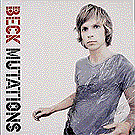

album of The Month
: 
BECK MUTATIONS
Let's call this song "Where it's Not": "There is no one, nothing to see," sings Beck. "The night is useless, and so are we." "Night birds will cackle," he intones on another track, "rotting like apples on trees." The twenty-eight-year-old Beck Hansen's new album, Mutations, brims with death, decay and decrepitude. But in its own peculiar way, it's also his prettiest record to date.
On Mutations -- recorded in two weeks last spring -- Beck stops talking down to his tuneful side. Compared with the funk collage of 1996's Odelay or the raw anti-folk of 1994's One Foot in the Grave, this is an album of comfort songs. Assisted by Nigel Godrich (who co-produced Radiohead's OK Computer), Beck finally gives his melodies -- some of them, like "Cancelled Check" and "Static," as old as his first demo tapes -- the full studio treatment, letting them seep into pellucid Sixties folk-pop arrangements. The most gorgeous example of this is "Nobody's Fault but My Own," a wise, dreamy song traced by sitars and strings arranged by Beck's father, David Campbell. "When the moon is a counterfeit," sings Beck, "better find the one that fits/Better find the one that lights the way for you." It sounds like he's singing about a bad relationship, but he might as well be delivering a personal manifesto; he's doffed the rhinestone suit and James Brown schtick for a new costume.
Mutations is a highly mannered album that references vintage psychedelic folk and rock as overtly as Odelay sampled Schubert. "Lazy Flies" has the same arch, carousel-like tone as the Beatles' "Being for the Benefit of Mr. Kite"; "Bottle of Blues" rolls along like the Kinks at their Muswell Hillbillies rootsiest. The album's affectations can be overpowering: "Lazy Flies" is a Hieronymus Bosch painting populated by "dead horses" and "shadows of sulphur." "We Live Again" is comically dreary; "Oh, I grow weary of the end," Beck moans. Amid the track's harpsichords and elevator-music slothfulness, Beck's insincerity -- which we can forgive or enjoy in other contexts -- doesn't quite fit; it seems a bit cold and removed.
But even if he doesn't find exactly the right pitch every time, Beck has entered his prime as a songwriter, which is exciting. Few lyricists of his generation are coming up with lines as good as "Doldrums are pounding/Cheapskates are clowning this town" ("Dead Melodies"). It's also a testament to his talent that he has so effortlessly assimilated bossa nova into his repertoire, as he did last year on the single "Deadweight" and as he does here with the wonderful "Tropicalia," a tribute to the progressive Brazilian music of the same name from the Sixties and Seventies. Like Brazilian musicians such as Caetano Veloso and Jorge Ben (who was sampled on "Deadweight"), Beck is a singer-songwriter with a sophisticated sense of rhythm. Here, a silvery, uplifting groove brings to life a macabre carnival in which "tourists snore and decay" and people "dance in a reptile blaze."
It's that combination of the straightforward and the surreal that Beck has always pursued, and on Mutations he's found some kind of balance. Like the blues singer he once wanted to be, he broods, moans and frets -- but there's joy in the music. (RS 800)
8/10 NATHAN BRACKETT
FATBOY SLIM
You've Come A
Long Way, Baby 
(Skint) 
A few short years ago, Quentin 'Norman' Cook was staring poverty, divorce and imminent nervous breakdown in the face. Despite a string of inspired chart-pop identities, the former Housemartin was out of luck and out of fashion. The solution, audaciously enough, was to reinvent himself once more, this time as the Noel Gallagher of '90s dance music.
No, really, hear me out. Both Norm and Noel share a Midas-like gift for populist sing-along anthems which tap directly into the national psyche. Both are bright sparks who have built their kingdoms on shamelessy dumb, angst-free hedonism. Take the analogy one step further and this second Fatboy album is surely the '(What's The Story) Morning Glory?' of big beat, right? Well, arguably, yes. After all, this is the huge, throbbing, timely pinnacle of a style which Cook himself pioneered and which can probably progress no further without imploding into self-parody.
It also contains at least two definitive late-'90s pop milestones - 'The Rockafeller Skank' and imminent 'Gangster Trippin' - plus a smattering of equally brazen candidates for immortality. Of course, the true test is what Cook delivers in addition to these platinum-plated hits. Even the Fatboy himself admits to being a singles specialist who generally loses it over the long haul. But here, for maybe the first time, he demonstrates commendable stamina. The best tracks don't aim to emulate the crowd-pleasers but veer off on their own tangents, like the belting '60s-meets-'90s rare groove of 'Soul Surfing' or the beatific 'Praise You', a melding of dreamy gospel and piano-powered beats with a warm 'Screamadelica' vibe. Magnificent.
Sure, there are throwaway one-liners like 'Fucking In Heaven' (loads of juvenile swearing set to a funky beat - genius!) plus functional club tracks like 'Build It Up, Tear It Down' (anyone remember SAW's 'Roadblock'?) but most are redeemed by Cook's saucy cheek and undeniable affection for his vintage source material. Crucially, there is an unforced and easy-going love of soul music evident here which contrasts starkly with the po-faced, anally 'authentic' checklist of cool references underpinning more 'serious' dance projects - the UNKLE album, say.
Ironically, the Fatboy even employs a DJ Shadow sample at one point, but he's equally likely to namecheck Pinky & Perky. This is not an album for old-skool trainerspotters. So has Norman Cook really made the '...Morning Glory' of big beat? He almost certainly doesn't care either way, which is entirely fitting, but you can't help suspecting he's too sussed to record a 'Be Here Now' for breakbeat kids. And even if the tides of fashion turn against his cheap-and-cheerful party style next week, you can be sure the Fatboy has the limitless joie de vivre and barefaced cheek to reinvent himself yet again, somewhere down the line. He's come a long way already, and this mighty album is his career peak to date. Check it out. Now.
8/10
Stephen Dalton
FUN LOVIN' CRIMINALS 100% Colombian

(Chrysalis)
FOR THOSE OF US WHO like to think we are well in touch with our sensitive sides, there nags that one eternal question: why is it that the lady always falls for a bastard? No such thoughts worry Huey. He suits the whole gangster schtick like it was measured up and handmade by Morty just for him. Fuck Cagney. Fuck De Niro. Fuck doze old guys. There's a new gun in town and the kittens are clinging like he's wearing cordite catnip for aftershave.
No doubt about it, FLC are the guv'nors. They do what we all do, remodel their lives through the movies, but they take it that one step further; they live their roles to the max. Exquisitely unbelievable, they have taken all the classic gangster elements - robbing, loving, having fun - and turned them into some of the sultriest, sexiest superdude soulpop since Prince was any bloody good.
On their debut LP, 'Come Find Yourself', they constructed a vividly narcotic Noo Yawk 'hood through which to caper and rumble. And now here's '100% Colombian', the same deal only a little more stoned, a little more streetwise, a little jazzier, a little more cool.
Much of this album sounds like it was conceived in the back of a stretch limo with Huey's lungs pipeful and croaking while all those macho films run in endless backdrop. There are the funny rip-offs ("a little bag with much too many seeds" on the punked-up '10th Street'), the local larger-than-life characters like the storekeeper in 'Korean Bodega', the reflections on mortality that habitually follow the heist ("You be dead by 40 but you make a lotta money" - 'Up On The Hill') and the exaggerated respect beloved of the mobster ("Barry White saved my life" - 'Love Unlimited'). There are all the urban musical signifiers too - swathes of smoky sax, the Ernie Isley vapour trail guitar, the melancholy Morricone silver trumpet that underscores betrayal on 'Back On The Block', the surprising little snatches like the riff theft from Tom Petty's 'American Girl' that puts the barrel to the backbone of the sleazy 'Big Night Out' ("Got a supermodel on my D" indeed!). All slo-mo seductive like a Pacino screen murder.
And all pure bullshit of course. Those powders fuck you up. Take one of those bullets, you could wind up in a bag. But you can't blame them for trying. When Sinatra passed on, there was a lot of garbage written about his appeal when it was absolutely bleedin' obvious that we were awed by Frank because he ruled his world. He'd done what we all fantasise about doing. He'd assumed the stature and the wealth to establish complete control. He was beyond the law, beyond our morals, just... beyond. At least until the Grim Reaper paid him a long-overdue visit, that is.
Jack Nicholson pretty much lives there now. The coolest man on earth. And who knows, a couple more albums like this selling by the multi-million and Huey may just oust him. Fantasy made flesh. Couldn't happen to a nicer (wise) guy. 8/10
Steve Sutherland
LAURYN HILL
The Miseducation Of Lauryn Hill
(Ruffhouse/Columbia) 
FORGET YOUR PREJUDICES one-time, two-times. The idea of the Fugees as a radical and innovative hip-hop band has, shall we say, dissipated a little over the past couple of years, in the wake of those lucrative but credibility-free cover versions and the scree of novelty hits perpetuated by Wyclef Jean and the feckless Pras Michel.
Still, at their best, the Fugees are/were capable of drawing lines between late-'90s American urban music and the conscious soul and reggae of the '70s to produce a fluent and impassioned kind of hip-hop. This is the cultural imperative around which Lauryn Hill's remarkable solo shot pivots. Imagine a rap LP made in 1975 with the kind of political and personal scope of 'What's Going On': or the idea of a young Stevie Wonder hitting his peak in 1998. That's what we're dealing with here.
At first glance, 'The Miseducation Of Lauryn Hill' appears a worthy but unappetising prospect; a concept album about the injustices of the music business - and Hill's ensuing battles with the array of fools, sexists and sceptics massed against her - that uses all the industry's machinery (and a guest roster of Mary J Blige, D'Angelo, Carlos Santana and, well, It Bites' Francis Dunnery) even as it denounces it. It's to Hill's credit, however, that emotional heroism prevails over poor-superstar whingeing, most unavoidably on the frail lullaby 'To Zion', where she serenades her son Zion and details the professional pressure on her to have an abortion with stark candour.
Essentially, 'The Miseducation...' is a document of triumph. Hill writes, arranges and produces virtually everything on this long and involving album with the kind of creative control and sure-footedness most artists wouldn't dare dream of. The emotional richness, vigour and range is astounding, from the clipped 'Living For The City'-style funk of 'Every Ghetto, Every City', to the bright reggae-gospel of 'Forgive Them Father', to the spectral Wu-stabs of 'Final Hour'. The video for the irresistibly swinging 'Doo Wop (That Thing)' makes explicit Hill's talent for locating the common themes between different eras of black music, as the action splits seamlessly between a '60s-costumed block party and a laid-back '90s street jam. At the heart of it all she's a euphoric visionary, revelling in the focus and the power.
There are elements here that may irritate: Hill's propensity to stretch the odd word to a histrionic 23 syllables or so; cutesy, superfluous classroom skits about "L-O-V-E" that chop up the flow of great songs; the frequent declarations of how brilliant God is; and one throwaway hidden track, a karaoke version of 'Can't Take My Eyes Off You', that Hill reportedly fought against being included. But in the face of so much overwhelmingly beautiful music - check the dissection of a failing relationship, 'Ex-Factor', where Hill soars into the transcendent territory of Aretha Franklin - such quibbles seem merely churlish.
As an article of faith in the possibilities of music to heal and inspire, and an album to convince doubters that late-'90s R&B is capable of measuring up to its classic '60s and '70s precedents, 'The Miseducation Of Lauryn Hill' is essential. Listen and learn. 8/10
John Mulvey